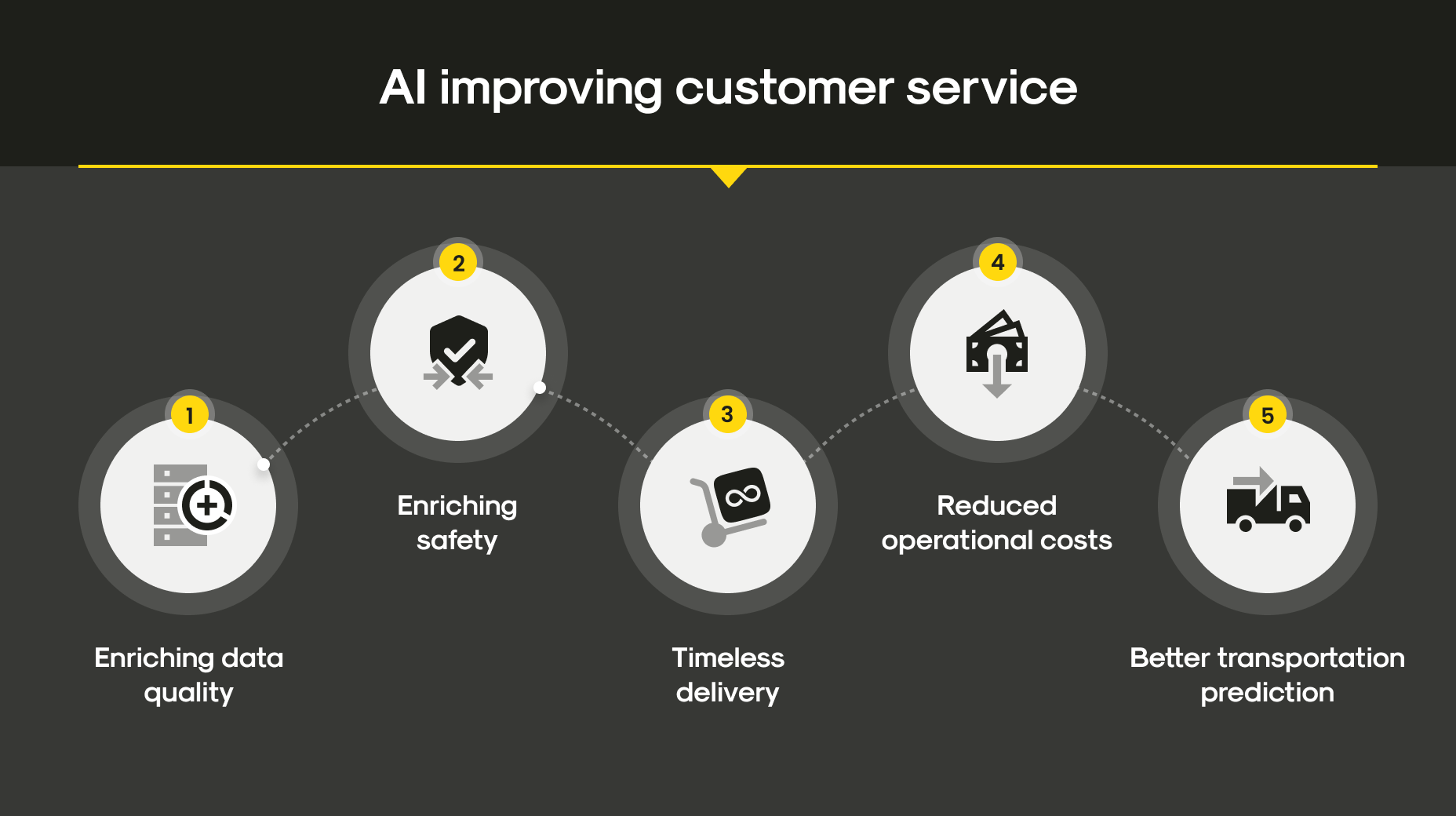Ask industry professionals and they’ll tell you: in the logistics world, timing is everything. Clients expect real-time updates, instant answers, and reliable coordination across complex delivery networks. Modern AI chatbots deliver just that: no breaks, no delays, just smart assistance across time zones. This nonstop availability enhances satisfaction, reduces costs, and builds trust at every stage of the supply chain.
Beyond their speed, chatbots bring consistency and scalability to logistics operations. They track shipments, notify customers of delays, update warehouse teams, and manage routine coordination across partners. What’s more, they do it while maintaining a personal touch, remembering client preferences and past issues to streamline every interaction. Simply put, AI chatbots are turning logistics communication into intelligent engagement that keeps operations flowing and clients informed.
In this article, you’ll find out:
- Why 24/7 real-time support gives logistics companies a competitive edge across time zones and markets
- How AI chatbots enhance supply chain coordination
- The key use cases transforming logistics: automated documentation, smart scheduling, and issue resolution
- How natural language processing makes chatbot conversations feel human, even in complex scenarios
- Common mistakes companies make with chatbot deployments, and how to avoid them
- Why the future of logistics depends on intelligent automation, integrated systems, and continuous learning
- How Mitrix helps companies design and scale chatbot solutions tailored to their logistics workflows
The 24/7 advantage: real-time responses across global supply chains
Unlike human agents who work in shifts, AI chatbots operate 24/7, and it’s a game-changer for global logistics. Whether it’s a carrier asking about a pickup, a shipper needing customs documentation, or a customer tracking a late parcel, chatbots deliver instant support, any time of day.

The results are real: studies show that 74% of users prefer chatbots for quick answers. That’s because they’re fast, accurate, and skip the queue. In logistics, that means fewer delays, faster problem resolution, and more satisfied partners, regardless if you’re dealing with B2B or B2C clients.
Real-world logistics chatbots already in action:
- DHL’s Parcel Chatbot delivers 24/7 tracking updates and delivery timelines, significantly cutting down on support center traffic.
- Aramex’s AI assistant supports freight customers across channels like WhatsApp, email, and live chat, handling requests in multiple languages with global reach.
- Captain Peter by Maersk acts as a smart cargo companion, offering real-time status updates, alerts, and automating repetitive transport inquiries.
Key Takeaway
AI chatbots provide real-time, round-the-clock visibility and coordination in an industry where delays can be costly. With faster updates, fewer miscommunications, and consistent service across time zones, they give logistics providers a distinct operational edge.
Use cases in logistics: smarter operations beyond the basics
Nowadays, AI chatbots do far more than relay tracking numbers. In logistics, they:
- Proactively notify about delays, reroutes, or customs holdups
- Help coordinate pickups and delivery schedules
- Automate documentation requests and compliance checks
- Facilitate issue resolution across carriers, clients, and internal teams
Companies that adopt chatbots across the supply chain report stronger relationships with partners and improved service-level agreements (SLAs). Let’s dive into how logistics players are using AI chatbots to improve coordination, clarity, and customer satisfaction.
1. Real-time shipment tracking and notifications
Forget generic “in transit” updates for good. Modern chatbots can pull detailed shipment data from backend systems and answer specific queries instantly. For example, if a customer asks, “Where is my pallet of automotive parts?” a chatbot integrated with a transport management system (TMS) can reply: “Your shipment is currently in Chicago, delayed due to weather. Estimated delivery is now Thursday at 2 PM.”
Chatbots can also send proactive alerts when there’s a route deviation, customs delay, or rescheduled ETA, reducing the need for inbound queries and building confidence in the process.
2. Coordinating pickup and delivery windows
Logistics scheduling often involves juggling multiple carriers, customer preferences, and availability. Chatbots act as smart schedulers, initiating conversations, confirming time windows, and handling last-minute rescheduling with minimal human input.
Let’s say a warehouse needs to arrange a freight pickup. Instead of waiting on hold or sending emails, a staffer simply messages the chatbot, which checks availability and confirms a pickup with the assigned carrier. Smooth, fast, and efficient.
3. Automating documentation and compliance queries
Shipping across borders means paperwork: invoices, bills of lading, certificates, customs forms. Chatbots can quickly retrieve, send, and even help generate the correct documents based on shipment type, destination, and regulations.
A freight forwarder asking, “Do I need a phytosanitary certificate for this shipment to Brazil?” gets an instant answer, not a 24-hour email reply. That speed reduces bottlenecks and helps prevent costly compliance issues.
4. Issue resolution: from damaged goods to route disruptions
When things go wrong (say, a damaged shipment, lost container, or missed deadline) speed and clarity matter. Chatbots can collect all relevant details, such as photos, location, reference numbers, and either resolve the issue autonomously or escalate to the right team instantly.
By centralizing communication, they reduce confusion, eliminate “email tennis,” and get everyone aligned on the next steps faster. Plus, all interactions are logged and traceable, improving accountability.
Human-like conversations that build trust
Thanks to natural language processing (NLP), chatbots today understand logistics lingo, context, and intent. That means chats feel intuitive and helpful, not robotic or scripted.
Chatbots can now:
- Understand vague questions like “Did the shipment leave yet?”
- Recall prior interactions (e.g., repeated customs issues)
- Route conversations to human agents when needed without dropping context
This creates a smoother support experience, especially during high-stress situations. When a customer or partner can ask, “Is the delivery stuck at customs again?” and get a relevant, reassuring answer in seconds, it builds trust. AI chatbots that “speak logistics” and handle complex interactions effectively build confidence across the supply chain. They reduce friction, support time-sensitive conversations, and make partners feel heard, even when problems arise.
Why chatbots are a smart business investment in logistics
As of today, chatbots are not just support tools, they deliver measurable ROI. Here’s how:
1. Lower operating costs
By deflecting routine queries (which make up a majority of inbound messages), chatbots reduce strain on customer service and ops teams.
2. Faster response times
Instant support reduces lag time in delivery coordination, customs clearance, and partner communication.
3. Resilience during peak demand
Whether it’s the holiday rush or a major weather event, chatbots handle surges without sacrificing quality.
4. Data-driven optimization
Chatbot logs reveal frequent pain points (like repeated route delays or doc errors) which can inform better operational strategies.
5. Better partner and client retention
Fast, clear communication keeps everyone in the loop. That reliability is key to earning long-term trust.
Common pitfalls (and how to avoid them)
To get these benefits, execution matters. Here’s what to avoid:
- Over-reliance on scripted replies. Train bots to handle nuance
- No clear handoff to humans. Ensure escalation flows work smoothly
- Data blind spots. Connect your chatbot to real systems (TMS, CRM, WMS)
- Ignoring privacy concerns. Prioritize compliance and transparency
The best logistics chatbots are tested, monitored, and continuously improved based on real-world usage.
The human touch: how AI chatbots feel more human than ever
Let’s debunk one common myth: chatbots are cold and robotic. Modern AI chatbots use NLP to understand nuance, context, and even sentiment, making interactions surprisingly human-like.
- They parse ambiguous questions and clarify intent before answering
- They remember past interactions, personalizing responses across sessions
- They escalate to human agents seamlessly when issues require empathy or complex judgment
At the same time, while chatbots bring huge benefits, poorly designed ones can hurt satisfaction. Common pitfalls include:
- Over-reliance on scripted responses that don’t adapt to customer needs
- Lack of clear escalation paths leading to dead-ends and frustration
- Ignoring user privacy and data security concerns
That’s why successful chatbot strategies prioritize design, testing, and iteration. Collecting feedback, fine-tuning responses, and ensuring that bots know when to hand off to humans are essential to long-term success.
Why logistics will rely on AI chatbots in the future
As supply chains grow more complex, real-time communication will become the differentiator. AI chatbots offer:
- Instant updates and coordination at scale
- Smarter resource allocation via automation
- Stronger customer and partner relationships through better communication
- Resilience in the face of disruption
In 2025, logistics companies that embrace chatbots won’t just move goods faster. Instead, they’ll build more transparent, reliable, and scalable operations.
How Mitrix can help
At Mitrix, we deliver AI/ML and generative AI development services that help companies:
- Design intelligent bots that understand supply chain workflows
- Integrate chatbots with tracking systems, CRMs, ERPs, and TMSs
- Build multilingual, multi-channel support agents (WhatsApp, web, SMS)
- Monitor performance and apply machine learning for ongoing improvements
At Mitrix, we build AI agents designed around your needs, whether you’re looking to boost customer support, unlock insights from data, or streamline operations. Let’s create a robust AI agent tailored to transform your business!
Customer support agent
Delivers 24/7 customer assistance, resolves inquiries efficiently, addresses issues, and enhances overall customer satisfaction.
Healthcare assistant
Performs preliminary symptom assessments, organizes patient records, and provides accurate medical information.
Financial advisor
Delivers tailored investment advice, monitors market trends, and creates personalized financial plans.
Sales agent
Identifies and qualifies leads, streamlines sales processes, and drives growth by strengthening the sales pipeline.
Data analysis agent
Processes and interprets large datasets, delivers actionable real-time insights, and aids in strategic decision-making.
Virtual assistant
Organizes schedules, manages tasks, and provides timely reminders to enhance productivity.
Whether you’re coordinating international freight, managing warehouse logistics, or optimizing last-mile delivery, Mitrix can help build the chatbot system to match. Contact us today to discuss your chatbot!
Summing up
Valued at $15.57 billion in 2025, the global chatbot market is booming, and for good reason. The logistics industry, with its constant need for real-time communication and rapid problem-solving, is reaping the benefits. From tracking shipments in real time to resolving issues before they escalate, chatbots boost efficiency, slash costs, and keep clients in the loop 24/7.
But their real power lies in how they scale operations without sacrificing the human touch. With natural language processing, smart escalation, and deep integrations across logistics systems, modern chatbots don’t just respond, but understand, anticipate, and solve.
Whether you’re looking to modernize your customer support, speed up documentation, or gain real-time visibility across your supply chain, the message is clear: the future of logistics runs on intelligent AI.


